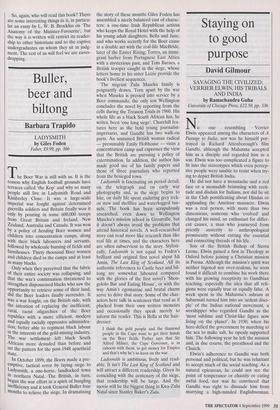Buller, beer and biltong
Barbara Trapido
LADYSMITH by Giles Foden Faber, £9.99, pp. 366 The Boer War is still with us. It is the reason why English football grounds have terraces called 'the Kop' and why so many people still live in Ladysmith Road and Kimberley Close. It was a large-scale imperial war fought against determined guerrilla soldiers and Britain finally won it only by pouring in some 600,000 troops from Great Britain and Ireland, New Zealand, Australia and Canada. It was won by a policy of herding Boer women and children into concentration camps, along with their black labourers and servants, followed by wholesale burning of fields and farmhouses. Thirty thousand Boer women and children died in the camps and at least as many blacks.
Only when they perceived that the fabric of their entire society was collapsing, and that the war's continuation threatened to strengthen dispossessed blacks who saw the opportunity to retrieve some of their land, did the Boer leaders finally surrender. It was a war fought, on the British side, with the intention of replacing the inefficient, rural, racist oligarchies of the Boer republics with a more efficient, modem and equally racially oppressive administra- tion, better able to regiment black labour in the interests of the gold-mining industry. The war settlement left black South Africans more denuded than before and set the pattern for the post-1948 apartheid State.
In October 1899, the Boers made a pre- emptive, tactical error by laying siege to La. dysmith, a one-horse, landlocked town In northern Natal. The British, in turn, began the war effort in a spirit of bungling Inefficiency and it took General Buller four months to relieve the siege. In dramatising the story of these months Giles Foden has assembled a nicely balanced cast of charac- ters: a one-time Irish Republican activist who keeps the Royal Hotel with the help of his young adult daughters, Bella and Jane, and who works secretly for the Boer cause in a double act with the real-life MacBride, later of the Easter Rising; Torres, an immi- grant barber from Portuguese East Africa with a mysterious past; and Tom Barnes, a British trooper caught in the siege, whose letters home to his sister Lizzie provide the book's liveliest sequences.
The migrant Zulu Maseku family is poignantly drawn. Torn apart by the war when Maseku is pressed into service by a Boer commando, the only son Wellington concludes the novel by reporting from the cells during the Treason Trials in 1960. His whole life as a black South African has, he writes, been 'one long siege'. Churchill fea- tures here as the bold young journalist- impresario, and Gandhi has two walk-on parts. An unnamed British woman radical — presumably Emily Hobhouse — visits a concentration camp and expresses the view that the British are pursuing a policy of extermination. In addition, the author has made good use of his family papers and those of three journalists who reported from the besieged town.
Ladysmith is fascinating on period detail; on the telegraph and on early war photography and, as the siege begins to bite, on daily life spent enduring grey trek- ox stew and shellfire and waterlogged tun- nels. The book has been scrupulously researched, even down to Wellington Maseku's mission school in Groutville, but it doesn't always avoid the problems that attend historical novels. A well-researched story can read more like research than like real life at times, and the characters here are often subservient to the story. Stylisti- cally, Ladysmith is not equal to Foden's brilliant and original first novel abput Idi Amin, The Last King of Scotland. All its authentic references to Castle beer and bil- tong are somewhat laboured compared with the glories of the first novel's `Shon- gololo Bar and Eating House', or with the way Amin's egomaniac and brutal charm serve to drive that story. Some of the char- acters here talk in sentences that read as if plucked from their own written memoirs and occasionally they speak merely to inform the reader. This is Bella at the hair- dresser:
I think the gold people and the diamond people in the Cape want to get their hands on the Boer fields. Father says that Sir Alfred Milner, the Cape Governor, is in cahoots with them, to get money for Empire and that's why he's so keen on the war.
Ladysmith is ambitious, lively and read- able. It isn't The Last King of Scotland and will attract a different readership. Given its coinciding with the centenary of the siege, that readership will be large. And the movie will be the biggest thing in Kwa-Zulu Natal since Stanley Baker's Zulu.


























































 Previous page
Previous page